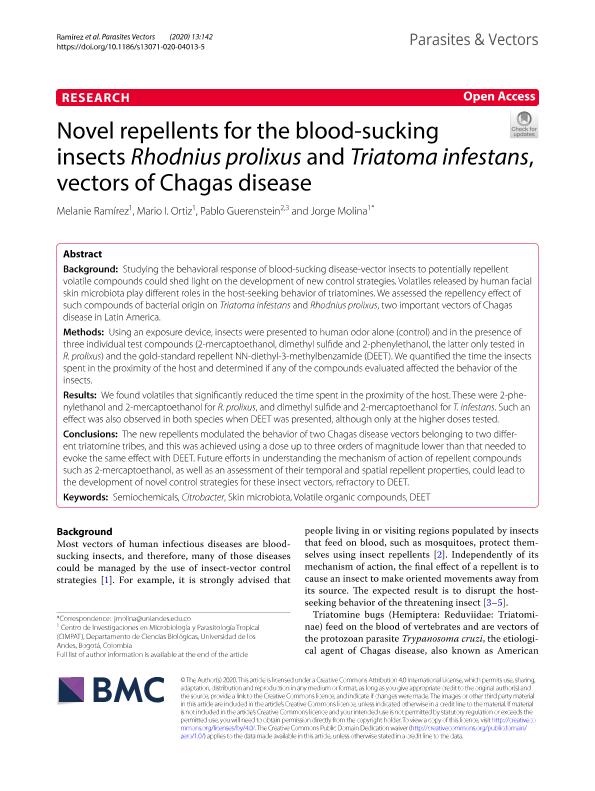Artículo
Novel repellents for the blood-sucking insects Rhodnius prolixus and Triatoma infestans, vectors of Chagas disease
Fecha de publicación:
03/2020
Editorial:
BioMed Central
Revista:
Parasites and Vectors
ISSN:
1756-3305
Idioma:
Inglés
Tipo de recurso:
Artículo publicado
Clasificación temática:
Resumen
Background: Studying the behavioral response of blood-sucking disease-vector insects to potentially repellent volatile compounds could shed light on the development of new control strategies. Volatiles released by human facial skin microbiota play different roles in the host-seeking behavior of triatomines. We assessed the repellency effect of such compounds of bacterial origin on Triatoma infestans and Rhodnius prolixus, two important vectors of Chagas disease in Latin America. Methods: Using an exposure device, insects were presented to human odor alone (control) and in the presence of three individual test compounds (2-mercaptoethanol, dimethyl sulfide and 2-phenylethanol, the latter only tested in R. prolixus) and the gold-standard repellent NN-diethyl-3-methylbenzamide (DEET). We quantified the time the insects spent in the proximity of the host and determined if any of the compounds evaluated affected the behavior of the insects. Results: We found volatiles that significantly reduced the time spent in the proximity of the host. These were 2-phenylethanol and 2-mercaptoethanol for R. prolixus, and dimethyl sulfide and 2-mercaptoethanol for T. infestans. Such an effect was also observed in both species when DEET was presented, although only at the higher doses tested. Conclusions: The new repellents modulated the behavior of two Chagas disease vectors belonging to two different triatomine tribes, and this was achieved using a dose up to three orders of magnitude lower than that needed to evoke the same effect with DEET. Future efforts in understanding the mechanism of action of repellent compounds such as 2-mercaptoethanol, as well as an assessment of their temporal and spatial repellent properties, could lead to the development of novel control strategies for these insect vectors, refractory to DEET.
Palabras clave:
CITROBACTER
,
DEET
,
SEMIOCHEMICALS
,
SKIN MICROBIOTA
,
VOLATILE ORGANIC COMPOUNDS
Archivos asociados
Licencia
Identificadores
Colecciones
Articulos(CICYTTP)
Articulos de CENTRO DE INV.CIENT.Y TRANSFERENCIA TEC A LA PROD
Articulos de CENTRO DE INV.CIENT.Y TRANSFERENCIA TEC A LA PROD
Citación
Ramírez, Melanie; Ortiz, Mario I.; Guerenstein, Pablo Gustavo; Molina, Jorge Luis; Novel repellents for the blood-sucking insects Rhodnius prolixus and Triatoma infestans, vectors of Chagas disease; BioMed Central; Parasites and Vectors; 13; 1; 3-2020; 1-9
Compartir
Altmétricas




